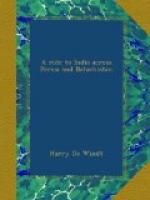The country round Meyun Kotal is well cultivated, and we passed not only men, but women, ploughing with the odd-shaped primitive wooden ploughs peculiar to these parts. Near the foot of the pass some children were gathering and collecting acorns, which are here eaten in the form of a kind of bread by the peasantry. Seldom has Nature seemed more beautiful than on that bright cloudless morning, as we rode through sweet-scented uplands of beans and clover, meadows of deep rich grass. By the track bloomed wild flowers, violets and narcissus, shedding their fresh delicate perfume. The song of birds and hum of insects filled the air, bright butterflies flashed across our path, while the soft distant notes of a cuckoo recalled shady country lanes and the sunlit hay-fields of an English summer. It was like coming from the grave, after the sterile deserts and bleak desolate plains of Northern Persia.
There is a small square building at the northern end of the Kotal Doktar, a mud hut, in which are stationed a guard of soldiers to be of assistance in the event of robbery of caravans or travellers. Such cases are not infrequent. Upon our approach, three men armed with flint-locks and long iron pikes accosted us. “We are the escort,” said one, apparently the leader, from the bar of rusty gold braid on his sleeve. “You cannot go on alone. It is not safe.” We then learnt that a large lion had infested the caravan-track over the pass for some days, and had but yesterday attacked the mail and carried off one of the mules, the native in charge only just escaping by climbing a tree.
Persian travel is full of these little surprises or rather items of news; for one must be of a very ingenuous disposition to be surprised at anything after a journey of any length in that country. If the man had said that an ichthyosaurus or dodo barred the way, I should have believed him just as much. Gerome sharing my opinion that the report was got up for the sake of extorting a few kerans, we soon sent our informants about their business, and calmly proceeded on our journey. Nevertheless, the Kotal Doktar would not be a pleasant place to encounter the “king of beasts,” I thought. The pass consists simply of a narrow pathway four feet wide, on the one side a perpendicular wall of rock, on the other an equally sheer precipice.
“Did you come across the lion?” was Mr. J—— ’s first question, as we dismounted at the gate of his telegraph-station at Kazeroon. “I suppose not,” he added, seeing the surprise with which I greeted his remark. “We have had three parties out from here this week, but with no luck. I just managed to get a sight of him, and that’s all. He is a splendid beast.”




